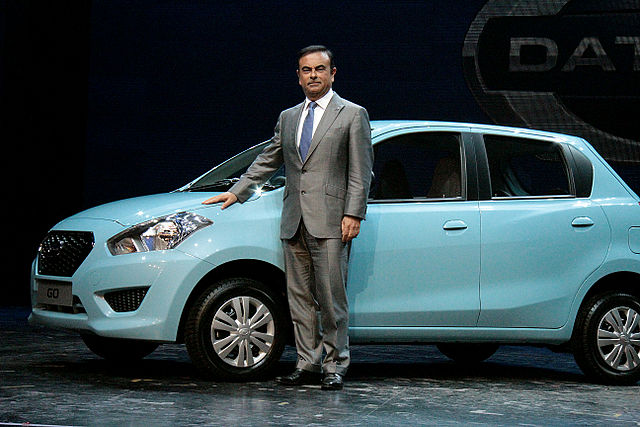News
Mitsubishi Motors board decides whether to oust Carlos Ghosn

FILE: Ghosn at Datsun Go launch in New Delhi, India (2013) (Photo By Bertel Schmitt – Own work, CC BY-SA 3.0)
TOKYO — The board of Mitsubishi Motors is meeting Monday to decide whether to oust Carlos Ghosn as chairman at the Japanese automaker, which is allied with Renault-Nissan.
Ghosn was arrested a week ago on suspicion of under-reporting his income by millions of dollars for five years. Nissan Motor Co., which already ousted him as its chairman, has said that an internal investigation found Ghosn abused company money and assets.
Mitsubishi Motors Corp. said the seven members of its eight-member board will meet later in the day.
Ghosn’s arrest on Nov. 19 marked a stunning fall for an executive who dominated the Japanese auto industry for two decades and spearheaded Nissan’s alliance with Renault SA of France.
Ghosn also led the addition of Mitsubishi into the alliance. Nissan took a 34 per cent stake in Mitsubishi in 2016.
Tokyo prosecutors are accusing Ghosn of under-reporting his income by 5 billion yen ($44 million) over five years.
It has not yet been possible to get comment from Ghosn on the accusations. Japanese media, citing unidentified sources, have reported Ghosn and Greg Kelly, an executive who was arrested on suspicion of collaborating with Ghosn, are asserting their innocence.
Neither Ghosn nor Kelly has been charged.
Under Japanese law, a suspect can be held in custody for up to three weeks per suspected charge without any charges being filed.
Renault has kept Ghosn as chief executive. There is little opposition expected at Mitsubishi, given the board makeup, to Ghosn’s ouster.
The board consists of Ghosn, Mitsubishi Motors Chief Executive Osamu Masuko, two people from Nissan, two from the Mitsubishi group companies and two outsiders — a writer and an academic.
Worries are growing about the future of the alliance between Renault and Nissan. The future of the alliance with Mitsubishi, being more recent, could be even more precarious.
Alliances often benefit automakers because they share technology, auto parts, and supplier and sales networks. Sales volume tends to lower costs.
Analysts say such sharing is growing in importance in recent years, as companies develop electric vehicles, net connectivity and artificial intelligence for autos.





















